I expected the Yemeni border to be scarier. Even the Oman border, where two of my travelmates were abruptly interrogated about why they had Afghanistan stamps in their passports, seemed scarier than the Yemeni immigration checkpoint in Sufreet. There is one strolling soldier with an automatic weapon, but he smiles and nods at me as if we were passing each other in a coffee shop.
All the same I thought I’d better listen carefully while Kais, our local guide and fixer, gives instructions to Matt. “Hide all the passports now,” he says. “Now we travel on the group visa, and we don’t have to show the passports.”
Matt hides the passports in the same bag that contains his drone. I told yesterday him if he flew the drone in Yemen I would pretend not to know him. Everyone had laughed as if that was a joke, but I was serious.
Our driver, Wagdi, drives us slowly down a winding mountain road from the border. I can see the ocean below, sandstone cliffs towering above, but the beauty of the scenery is overwhelmed at first by the mounds of smelly garbage and burnt-out abandoned cars lining the road. It reminds me of India, but less hectic. Sometimes we slow to avoid camels, cows and goats in the road, but there is little human traffic.
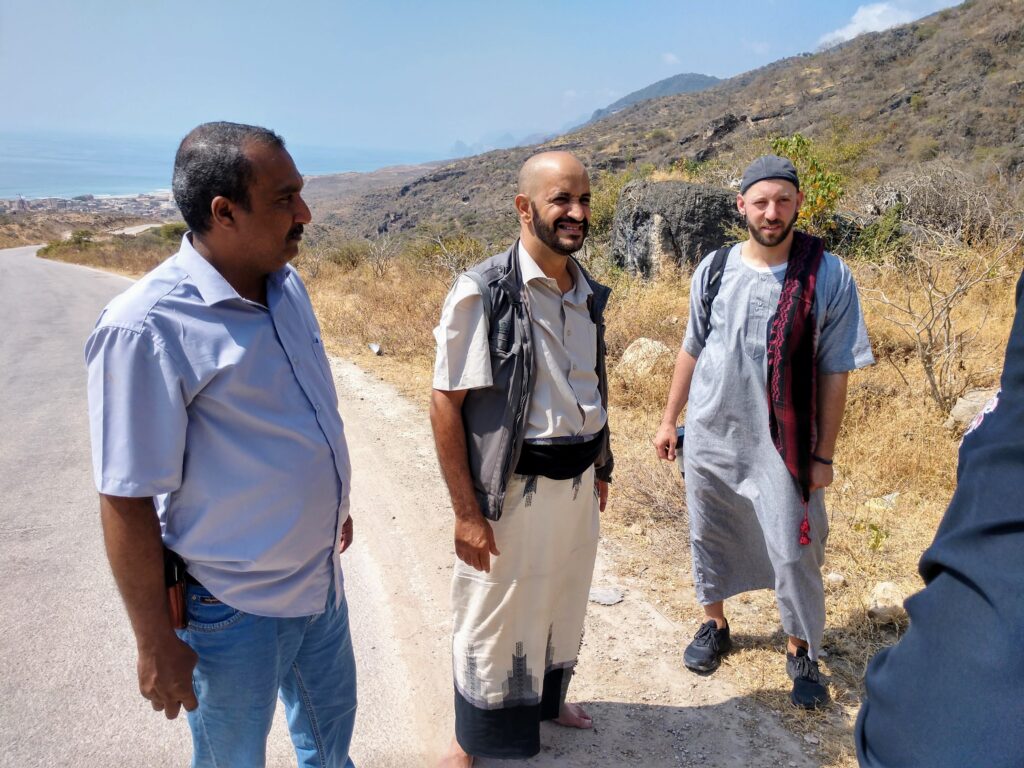

The road follows the coast, and Kais says it is OK to keep the windows open for now, although we will have to keep them shut in some other parts of the country. I stick my head out the window and revel in the ocean breeze. My black abaya and head scarf have been uncomfortably hot all morning.
We come to our first of many police checkpoints. A Yemeni in military camouflage speaks rapid Arabic to Kais, who hands him our group visa. Their voices raise. Sometimes it is difficult to tell if people are arguing because the language is guttural and the volume is usually high. We ask Kais what’s happening. “He wants your passports,” Kais says. “I told him it’s none of his business.” We wait for a few minutes while Kais explains that most of the Yemeni soldiers at the checkpoints are either paid by the Saudis or paid by the UAE. Finally, another soldier comes back and says we must wait while they copy the visa. Kais responds that they can keep it because we have many copies, and we drive away.
At my urging, Kais talks a little about his methods of keeping his clients safe. “I call the police three times a day,” he explains. “They tell me if there is anything going on so I can change my plan if I need to.”
“So you have a good relationship with the police?” I ask. He nods.
“I heard you made a documentary. Tell me about it.”
“It was called The Reluctant Revolutionary,” Kais says. “It was about my experience during the Arab Spring. I will send you the link to see it, but the Yemeni internet is so slow you probably will not be able to see it until you go home.”
Someone asks about Kais’ family, and he tell us he has three daughters. The oldest is 20. “Is she married yet?” I ask. Kais says, “Not yet. She had a fiancé, but he wanted her to stay home and leave university and cook for him. I told him to get lost.”
“But that’s not typical for a Yemeni father, is it?” I ask. Kais shakes his head. “It is up to the father here, and many fathers choose their daughter’s husbands for them. But for me, I say, it is up to you. It is your choice if you want to wear the veil, or go to school, or who you want to marry.”
I know Kais has traveled in the western world, although I’m not sure how much. He said he went to Germany for a film festival after The Reluctant Revolutionary was made.
We stop at a beach where 30 or 40 local men are in the water. The air smells fishy. When we get out of the car we see young boys pouring nets full of shiny small fish on the beach; mackerel perhaps. The fish thrash for a few minutes, their scales glinting in the sun, then gradually they stop moving.
“What a cruel way to kill them,” I remark.
“We do the same in North America,” Matt points out. Matt is our Canadian guide, and the company he co-founded, Inertia Network, is all about valuing the culture and connecting with the people of the countries they guide in. I notice whenever any of us is critical, Matt gently invites us to consider a different perspective. I appreciate that about him.
Inertia does trips in all the places Americans are not supposed to go to – Afghanistan, Iran, Iraq, North Korea. Matt himself, only 32 years old, has a more impressive travel resume than anyone I’ve ever met. There are two other travelers in our group: Maija, a Latvian nurse living in San Francisco, and Alex, a German DJ and videographer who spends six months a year in Thailand. Alex is making a video of our four-day trip through mainland Yemen. After the four days we will join a group of eight more people flying in from Cairo to go to the Yemeni island of Socotra.
Maija impresses me. She may not have traveled quite as much as Matt, but she has been many places in the Middle East. She just finished four weeks in Iran and northern Iraq by herself, something I wouldn’t even think of doing, and then she went to Saudi Arabia with Matt very shortly after the Saudi government announced the availability of tourist visas for the first time. She has already been to Socotra, so she will leave us and go home after our mainland visit.
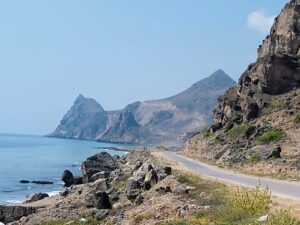
The road stretches into desert. There are camels to watch for a while, meandering on the side of the road or lying in the sand. Then it becomes monotonous and everyone in the car nods off.
I wake to the sound of Kais’ voice. “We are almost to where we stay tonight,” he says. Maija and I put our headscarves back on. We ride into a small city choked with honking cars. We pass storefronts, open air restaurants, market stands. We pull up to a tall building that says furnished apartments in English on the sign, and Kais and Wagdi pull backpacks off the roof of the car. Several men come out from behind a desk inside the building and show us up a flight of stairs to a two-bedroom apartment. There’s a bathroom with a squat toilet, and a living room with a low couch that goes all the way around the room. It is sparse, but recently renovated, and Maija says she won’t be able to sleep with the smell of new paint. “My most difficult wife,” Matt says; a joke that has carried over from the Saudi Arabia trip.
We’re taken across the street to see another, older room, where Maija decides to stay. At first I am to share a room with her, but then I decide I’d rather be with the rest of the group, so I move back to the apartment across the street. I still haven’t felt frightened yet, but I don’t want my first time to be in the middle of the night when I wake up and realize I’m not within shouting distance of Kais and Wagdi.
I change into a long skirt and blouse because my cheap abaya, ordered online from China, is ripping at the seams. It’s become a joke for us; every time we discover a new rip, we laugh hysterically and Matt mimes an Arabic commercial for abayas sold on bachelorparty.com. Kais has promised we’ll go shopping after lunch, but I can’t wait, because one rip is below my armpit and my bra shows through.
I feel better in my street clothes, but people on the street stare at me. All of the women are wearing black abayas, and most have full face cover, including Maija. The restaurant Kais takes us to has a bare room with men sitting on the floor, eating with their hands. The waiters show us into a private room in the back that has air conditioning and a low, wrap-around couch like the one in our apartment. We sink into the cushions, blissful in the cool air. Kais orders too much food and we share everything; rice, fish, chicken, yogurt, salad, hummus, and huge pieces of what looks like Indian naan. Alex and I worry out loud about all the leftover food, but Kais explains that he has already arranged for it to be given to the poor.

“You see, I always want to make sure people see that safe tourism is good for everyone,” he says. “I make it worthwhile for the police, the government, the business owners, the poor people.” Several times during the day women and children have approached me to beg for money, and each time, Kais has given them small bills. After a while I start pointing at Kais whenever a child puts her hand out.
We go back to our apartment and sit out the hot afternoon hours in our living room, sipping from bottled water that Kais and Wagdi buy for us every few hours. Kais introduces Alex and Matt to khat, a stimulant-containing plant he chews constantly in the afternoons. It is illegal in the US and other Western countries, but here in Yemen it is considered a cultural and social tradition.
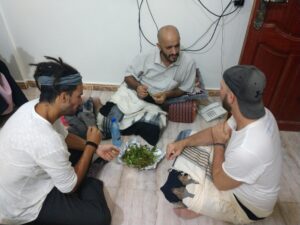
Kais tells us about his experience growing up in a country in which women are inaccessible. “I might as well have thought babies came from a women’s knee when I was young,” he says. “We hardly know anything until our marriages are arranged.”
“What was it like when you first went to a country where the women were open?” Alex asks.
“It was like seeing a movie, and then suddenly you are in the movie,” Kais answers, chewing.
Kais, Alex and Matt talk about Middle Eastern politics, foreign relations and terrorism. The conversation is over my head, so I just listen. I try a couple khat leaves, but they’re bitter and I spit them out. Then I find Kais’ documentary on Youtube but the internet connection is indeed too slow to watch it.
Alex wants to start filming an interview with Kais, but Kais says the conversation is too dangerous to film right now. We have plenty of time, he says; if you want to hear the real story of the rise of Al Qaeda, let’s do that now and we can film later.
At 5:00 pm, Kais says the shops will be open now and we can go out. We need to find an abaya and hijab for me, and sunglasses for Maija, who lost them in Oman yesterday when we went swimming in the ocean and an unexpected wave knocked her over. We walk down crowded market streets and everyone stares at me. I dread wearing a black robe and face cover in this heat, but I think maybe it will be worth the discomfort to stop being the center of attention.
The abaya shop we stop in has hundreds of black robes lining the walls. The shopkeeper pulls out a frilly abaya with sequins on it. I shake my head. “Plain,” I tell him. “And big. And not too hot.” Kais speaks Arabic to the shopkeeper and feels the fabric of each abaya the shopkeeper pulls out for inspection. We settle on one, and Kais negotiates the price for me. It will be 16,000 rial, about thirty American dollars. I haven’t changed enough money and Kais loans me some of his.
After shopping we go back to the apartment again. Kais has told us we must not be out after dark, even though the city we’re in is relatively safe.
“Tomorrow we get up at 5:30 and leave at 6:00,” he tells us just as I am getting ready to go to bed. “We have a long drive, and we will be going to a more conservative part of the country. You must keep your face covered.” Our original itinerary had called for us to spend tomorrow night in Al Mukalla, but Kais says this is too dangerous and we must drive further. I’m relieved, because in the reading I did before the trip, Al Mukalla was mentioned as a previous Al Qaeda stronghold. I ask Kais about this. He says, “Yes, they bombed Al Mukalla and Al Qaeda was gone. But only one body was found. Where did they go? Who tipped them off?”
The call to prayer wakes me up at 4:30 the next morning, echoing eerily through the streets of the city. It gives me a little time to write before we have to pack up. When I come outside, Maija is doing something to Wagdi’s hand, and she explains that he went to the hospital last night for an ear infection and they put an IV catheter in his hand and sent him away with needles and antibiotics to administer himself. We both marvel at how different this is from how it would be treated in the U.S. Wagdi apparently had trouble with the catheter and says it hurts, and Maija has taken over.
“I’ll bet you didn’t know you would have a private nurse on this trip,” I tell him. Maija says she wants to go back to the hospital with him tonight so she can see what Yemeni healthcare is like.
We’re sitting on benches outside the hotel, on the deck of a juice shop. Kais tells me to move over to a different table. I move, giving him a puzzled look. He points up at a wobbly fan spinning above where I was sitting. “I don’t like the look of that fan,” he says. He is looking out for us in more ways than I had expected.
We start the long drive along the coast toward Al Mukalla, where we will detour up into the mountains. Kais has bought us bread and cheese and fruit, and we pass them around the car. It gets hot by 8:00 am, and we doze intermittently, heads lolling against the backs of our seats. My new abaya makes me feel like I’m cooking in a microwave oven.
Kais has warned us that there will be frequent police and military checkpoints today. “At first they will be friendly,” he says, “and no need for the ladies to cover up. But I will warn you when we start getting close to Al Mukalla; it will be different there.”
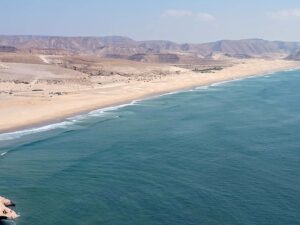
We stop several times for the views. At one point the road winds up a cliff face and overlooks a broad expanse of ocean and white sandy beach. It is completely deserted and there is no development along the shore. “This would be multi-million dollar real estate in some parts of the world,” Maija points out as we snap photos from the edge of the cliff.
Back in the car we listen while Matt and Alex entertain us with their ongoing Australian cooking show imitation. It started when they were driving a load of tents, which will be used for camping on Socotra, down from the Muscat airport to Salalah, a long two-day drive.
“It needs just a touch of ginger to bring out the flavor of the feesh,” Matt says with a perfect, although exaggerated, Australian accent.
“Yes, I’d give it a seven,” Alex says, his accent almost as good. We laugh.
As we get closer to the more conservative area of the country, Maija and I begin putting our face covers on as we approach each checkpoint. We look at each other to check for stray blonde hairs, tucking them behind head scarves. The first checkpoint where we have trouble is just before Al Mukalla. The soldiers, whom Kais explains are paid by the UAE, wave us over to the side of the road. There is a long conversation between Kais, Wagdi and the soldier in charge. Papers are handed back and forth, and the soldier goes back to his booth with them. Kais gets on the phone with someone and it sounds as though he is protesting. We wait, and a half hour passes. We ask Kais if we can get out of the car, and he points us to a shady spot in a garbage-strewn empty lot on the side of the road, where we sit on cinder blocks. Although we don’t know what’s happening, I don’t feel afraid.
The soldier calls Kais and Wagdi over, and then Kais walks back to us and tells us what’s going on. “They don’t like that we have an American,” he says.
I’m embarrassed. “I’m sorry,” I say, helplessly.
“Don’t be sorry, it is OK,” Kais says. “I have called the General and he will smooth it over at the rest of the checkpoints. He will meet us at the hotel tonight.”
We get back in the car, and the next few checkpoints are uneventful. Kais tells us we don’t even have to put our veils on, which is a relief.
We stop at a roadside restaurant for lunch, and Kais tells us we do need to cover up here. “It is safe,” he says, “but they will let us eat in the family room because we have the ladies, and that will be better.”
But after Kais checks out the family room he shakes his head. “Too many flies,” he says. We walk around to the front of the restaurant and it seems OK, it’s empty except for the staff. We take off our shoes and sit on blankets on the floor, and waiters bring us too much food, just like yesterday. There is chicken and fish and rice and giant naans again. We eat with our fingers from shared plates. I ask more questions, trying to understand what the checkpoints are for.
“Were all these checkpoints here before the war?” I ask. Kais shakes his head. “No, they are because of the war. The UAE pays Yemeni soldiers much more than they were paid before. The Emirati general manages it all from Dubai or somewhere else. They are checking for drugs, guns, spies, whatever.”
“But why are there so many more now than there were yesterday?” I ask.
“Because this is the main route to go to northern Yemen, where the Houthis are fighting.”
After lunch we hit another checkpoint and get pulled over, and we sit on the side of the road again. I wonder if there will be a checkpoint that won’t let me through, and I will have ruined the trip for the whole group. Kais makes more phone calls, and papers are passed back and forth again. Finally, they let us pass.
We drive for a few more hours, ascending mountain roads, and the air gets cooler. We reach the hotel shortly after dark, and I am surprised to find that it’s a castle perched on the edge of a vast canyon. It’s too dark to see the canyon yet, but the castle is impressive. Wagdi explains in broken English that it’s owned by a wealthy local businessman who also owns the nearby hospital, as well as a palace on the canyon floor that used to be a hotel. But since the war began, he and his family have been in Saudi Arabia.
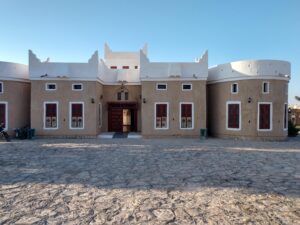
Maija and I are shown to a room outfitted like a medieval castle bedchamber, with carved wooden headboards, a stone floor, and intricately carved wooden window shutters and doors leading out to a balcony. We go to the dining room in the main part of the castle, where Kais has ordered tea, bread and beans for a light dinner. We meet Robyn, a Canadian friend and client of Matt’s who has been traveling with her own guide since she left Saudia Arabia with Matt and Maija a week ago. She says she would have preferred to be with us, but she booked her own guide back before Inertia decided to do a trip on the mainland. Now she regrets it, because her experience with the travel company she’s using has been terrible.
“It’s hard enough to be a foreign woman in this country, but the first driver I had kept touching me inappropriately,” she tells me at dinner. “Then I got another driver and he doesn’t touch me but he speaks to me in a very perverted way. And my guide disappeared on me this morning.”
“He did what?” I exclaim, incredulous. “He literally disappeared?”
“He left to take care of some personal business last night and said he would be back in the morning, and then he didn’t come back. And all day yesterday I was with a new driver who didn’t speak English, and I didn’t know what was going to happen. It’s been very stressful.”

Kais is already taking care of it. He says he can’t let Robyn ride with us because she isn’t on our visa, but he will speak to the agency and make sure they send a new guide, and he’ll also let Robyn’s car follow ours so we can all be together. I can see that Robyn is visibly relieved. I tell her the story of Kais making me move from under the wobbling fan. Once the subject of her bad experience is finally behind her, she begins to tell me about her recent travel. She is a bank consultant from Toronto, but ever since traveling to Afghanistan last spring with Inertia, she has been on a six-month sabbatical to travel through the Middle East. She’s been everywhere, including Syria, which she loved.
“I haven’t really been interested in visiting Syria,” I tell her. “What did you love about it?”
“The coastal cities are very European, very Mediterranean,” she says. “There is so much history, but also a cosmopolitan feel.” I consider putting Syria on my growing list of Middle Eastern cities I want to visit.
The next morning light coming through the shutters wakes me early. I sit on the balcony with my laptop until it’s light enough to explore and then I go out to look over the stone terrace wall into the canyon below. The view is stunning. Below the sheer canyon walls are villages of mud brick structures, some ancient and crumbling, others newer and inhabited. This is the famous Wadi Doan, and it is more beautiful than the photos I’ve seen can possibly express. There are trees and green shrubbery and what looks like a dry riverbed, although Kais explains it is only from floodwaters that come once a year at most. It looks like the lost city of Pompei at the bottom of the Grand Canyon. The stone terrace stretches a good length along the canyon rim, and Maija and I walk to one end and then the other. One end has a raised platform with an infinity pool reaching right to the edge of the rim, and Robyn joins us there. We can see that Matt and Alex are up now too, and Matt is flying his drone over the canyon.
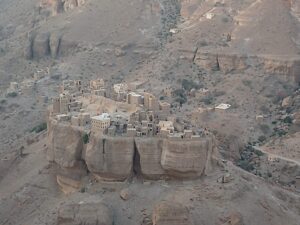
I walk around snapping photos of the canyon and the hotel. Coming back from the dining room I run into a Yemeni man who stops me and introduces himself as Jamal.
“Where are you from?” he asks. “Canada,” I reply automatically. In a third world country, that question always puts me on edge.
“Oh, are you from Toronto? he asks. “No, you must mean Robyn,” I tell him. “She’s around the corner at the pool.”
“I am her new guide,” Jamal explains.
“Oh! I’m sorry, I lied, I’m American,” I confess. “I didn’t know who you were or why you were asking where I was from.”
Jamal smiles and says it’s no problem, he understands. I take him to the pool to meet Robyn, and then introduce him to Kais, Matt and Alex. Jamal speaks of Kais as if he is a legend, which I suppose he must be in the Yemeni travel industry world.
Breakfast is eggs, bread, olives, beans, yogurt. I am careful with my stomach, which has already been upset by something, despite my efforts to use bottled water even for brushing my teeth. Matt and Alex play the Australian cooking show again.
“I loik what you’ve done with your beans,” Matt says, looking at Alex’s plate. “They just need a hint of gahlic.” “I think there is also an element of citrus,” Alex replies.
After breakfast I meet a Yemeni man in the lobby whom I assume is Robin’s driver. His stomach strains at the seams of his traditional Yemeni button-down shirt, and his teeth are very bad. Kais translates for him while he asks me what I think of Trump.
“He’s rude, crude and ignorant,” I say without hesitation. “He doesn’t understand anything about the rest of the world and he’s an embarrassment to most Americans in my social circle.”
“He understands real estate and how to make money, that’s about it,” Alex adds.
“I don’t even give him that,” I reply. “His father handed him money and gave him his start in the real estate business.”
“Well, he understands reality TV, right?” says Matt. “That I’ll give him, and that’s about it,” I say.
We load the car and drive down to the canyon floor. Part way down to the canyon floor we stop for photos and Matt flies his drone again.
“We got permission from the General,” Kais says, nodding toward a car that has been following behind us. To my horror, I realize the man in the car is the same one I assumed was Robyn’s new driver. He is actually a general in the Yemeni National Army, and I have just badmouthed my country’s leadership to him. I whisper to Maija that I wonder what he thinks of me.
“Better that you said bad things about Trump than the opposite,” she says, laughing. “If you said good things maybe you would not be leaving Yemen.”
We continue the drive, and at the bottom of the canyon we stop in one of the settlements of the Wadi Doan. This one has an enormous concrete palace towering over the other structures, and Kais explains that this is the former hotel now owned by the businessman who owns the castle hotel. Since he and his family are gone, the caretaker says we can come in and see the inside, but only up to the second floor. We ascend tiny steps that must have been designed with the traditional Yemeni men’s skirt in mind. Rectangular corridors frame an open courtyard, and the rooms still have numbers on them from the building’s hotel days. Kais tells us that the top floors, where the family’s living quarters are, are being renovated while the family is in Saudi Arabia.
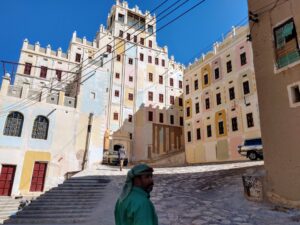
We drive along the canyon floor, stopping for photos of the mud buildings. There is only one checkpoint in Wadi Doan, and Kais has told us this one is a problem because one of the soldiers is known to have sold information about tourists to the Saudi secret police to get them deported, even when they have a proper visa. This is why he asked the General to come with us this morning. Maija and I rush to put our face covers on as we approach the checkpoint, but we needn’t have bothered; the General’s car proceeds us, and we’re not even asked to stop. The soldiers stand in salute as we pass through.
In the next village we stop at a honey shop. Wadi Doan is known as the birthplace of Sidr honey, widely regarded as the best – and most expensive – honey in the world. We taste the honey, and Alex and Maija buy some to take home. The General comes in to say goodbye, and this time he is carrying his automatic rifle slung over his shoulder. We thank him for escorting us.
We drive another hour to the city of Shibam, known for its high-rise mud brick buildings. Listed in 1982 as a UNESCO world heritage site, it is now designated by UNESCO as “world heritage at risk.” Kais says we will walk through Shibam tomorrow, so today we just stop to take photos from a distance. We’re approaching the hot hours of the afternoon and he wants to get us to lunch and to our apartment in Seiyun.
Seiyun is the city that houses the airport we will fly to Socotra from, and according to Kais, it is controlled by Saudi secret police. He has booked us two private apartments, one for the women and one for the men, instead of a hotel; he says we will be conspicuous at a hotel because of the size of our group. We stop at a restaurant that has small enclosed rooms for families, where Maija and I can take our hijabs off to eat. We order the usual feast of chicken, fish, rice and salad, and a man named Mohammed joins us for lunch carrying an automatic weapon. He has been hired as extra security for us while we are in Seiyun. Mohammed doesn’t speak any English, but he seems friendly and smiles at us whenever we look his way. Alex poses for a photo with Mohammed’s gun, and with his Yemeni skirt and headscarf he looks like a local. We laugh.
“Promise that you won’t post those photos on social media,” Alex says to Maija and me.
After lunch we go to the apartments. They are side-by-side and surrounded by walls with a gate that can be closed at night. Maija and I have two bedrooms, a living area, a bathroom with a western toilet, and even a TV. There is a large, empty, carpeted room that is apparently meant as a dining room, since Yemenis typically eat sitting on the floor. After settling into our apartment we go next door to hang out with the men. We have internet, and although the connection is slow I find I can finally watch Kais’ documentary.
The production is directed by a British filmmaker named Sean McAllister. He and Kais met in 2010 after some European tourist clients introduced them. It features Kais as a disillusioned travel industry professional who is a supporter of the regime under President Saleh before the war begins, but who gradually joins the revolutionary movement after witnessing firsthand the slaughter of 52 Yemenis during the Arab Spring uprising. It also documents Kais’ personal losses during 2011; the hotel he owns falls into financial trouble as tourism in Sana’a wanes, and he struggles to maintain his father’s tourism office. He loses the hotel, and his wife, pregnant with their third child at the time, threatens to leave him. Kais explains to me later that McAllister and his crew began filming in early 2011, but the deportation of other journalists by Saleh’s government in the spring sent McAllister back to Britain, fearing for his safety, and the filming was finished by Kais himself. There is footage of the shooting at the revolution’s camp in Change Square in Sana’a, and of the aftermath in a nearby triage center, where we see dying men and children. I swipe at my eyes, hoping no one is watching me. Everyone else has already seen the film, and the details of the Arab Spring are old news to them.
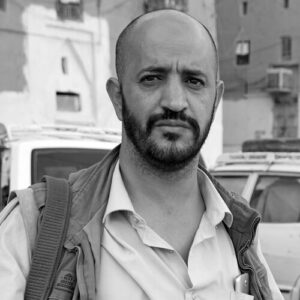
Wanting to know more about Sean McAllister, I take a break mid-way through and go to his website. It is blocked, labeled as “inappropriate content.” I show my laptop screen to Kais, who seems surprised.
I go back to the documentary. It ends with interviews of grieving Yemenis as they bury their dead in mass graves. Captions tell us that as of the release of the film in 2012, Saleh finally gives up control to Vice President Hadi and leaves Sana’a shortly after the massacre, and that Kais is still with his wife. It’s a hopeful ending, but of course we know that Yemen is still in the throes of civil war seven years later, and Saleh’s resignation did nothing to advance the cause of democracy. The Houthi rebels, funded by Iran, are now in control of Sana’a and the rest of northern Yemen, and Hadi was exiled to Riyadh as the Southern Transitional Council (STC) in Aden fought to restore his government. Saleh, after aligning himself first with the Houthis and then with the Saudi-led coalition fighting the Houthis, was assassinated in late 2017. Worst of all, the Saudi-led coalition is supplied by American and British weapons, which end up being used to kill Yemeni civilians. The UN has named us war criminals for our part in this proxy war, in which Yemen is nothing but a puppet for Saudi Arabia, the UAE and Iran.
I have a thousand questions for Kais, but he’s busy getting us organized to go out when I finish watching. We’re going to pick up Robyn at her hotel, and then to pick up dinner to bring back. Matt has been staying in touch with Robyn all day to make sure she is OK, and she says the day with Jamal has been much better but she would still like to spend the night with us. Kais tells her to make an excuse so Jamal will not be offended.
To our surprise, Kais says we can come with him and Mohammed as long as we keep our faces covered and don’t get out of the car. We pick up Robyn, then go to change money and get dinner. Driving around the crowded, noisy streets of Seiyun we feel like we are doing something deliciously forbidden. The Muslim call to prayer echoes through the streets and we are each glued to a window, watching the nightlife we don’t normally get to see. We stop at the massive Seiyun palace and Kais says we can get out to take a photo as long as we make it quick and don’t use the flash on our cameras. The palace is centuries old and was known as the seat of Sultan al-Kathiri, but Kais says now it has been taken over by the Saudi army, which is why we can’t go inside, even tomorrow in the daylight.
Over breakfast the next morning Robyn tells us her original itinerary with her travel agency included a visit to Sana’a. Kais is visibly shocked. “They were going to take you to Sana’a?” he asks. Robyns nods, and explains that during the two months previous to the trip she kept up on news from Sana’a and decided to decline that part of the itinerary.
“You heard about the three Canadians, right?” Kais asks. “They were arrested and deported, and that was very nice of the Houthis. Usually they lock you up.”
“What were they arrested for?” I ask.
“They were in Sana’a without a visa. And you cannot get a visa to visit Sana’a right now, which means Robyn’s agency was going to take her there without one.” He shakes his head.
We pack up and head out for the morning. We are driving to see an imam shrine first, and then to see the city of Tarim. In the car I am dismayed to discover that half of our group, including Alex and Kais, subscribe to varying levels of September 11th conspiracy theories. Alex is particularly vehement about it – the World Trade Center towers could not have come down from the plane strikes alone. It was a CIA-backed plot. Kais is more cautious and says he believes Al Qaeda planned the attack, but he also believes the American government got involved in some way. He asks why there are no photos or videos of the plane that hit the Pentagon.
I don’t have specific facts at hand to argue against them, even though it is thoroughly rooted within my American mindset that conspiracy theories about 9-11 are crazy. I’m relieved to hear Matt thinks so too, although unfortunately he doesn’t really have facts at hand either. I decide the best course of action is to be quiet until the subject changes, which happens mercifully soon.
We pass through Tarim to a town on the other side, where we tour what looks like an ancient cemetery. It is called Aynat, and imam families of Haudramaut Province are buried there. There are headstones full of Arabic; I ask Kais to read one to us and he says it’s the burial place of a woman who was related to the imam family and most of the writing describes her family history. There are several mausoleums, and an elderly man, apparently the cemetery’s caretaker, shows us into two of them. Afterwards we drive back to Tarim and walk through the narrow alleys of the old town, where merchants sell food and clothing. Kais buys some roasted sunflower seeds, and Matt buys a Yemeni skirt as a birthday present for one of the clients who is joining us on Socotra.

Just outside the old town we run into Robyn as we’re taking photos of a mosque. She is happy to see us again. I sit with her guide Jamal on the steps of the mosque for a few minutes and it quickly becomes clear why she prefers to be with us. Jamal’s behavior is just on the edge of creepy. He tells me flirtatiously, after I complain that my face cover is too hot to wear except when Kais tells me to, that I have a beautiful face. I move away from him slightly. I’m probably old enough to be his mother.
Our last stop before lunch is to visit a school in Seiyun. On the way I sit in front with Wagdi and entertain him by taking my veil off between checkpoints. For some reason he thinks it’s hilarious, and each time we pass a checkpoint he mimes tearing a mask from his face as if he were liberating himself from prison.
The school yard is full of young boys who look eight to twelve years old. We’re invited into a classroom with about 30 boys seated on benches. Our arrival is clearly an event; they can’t stop staring at us, and they ask us questions while Kais translates. Kais tells Alex to teach them a class in English. Alex is flustered at first, but he rises to the occasion and stands at the whiteboard. He writes each of our names and where we’re from, and the boys repeat after him in unison. “Anna from America. Alex from Germany. Maija from Latvia. Matt from Canada.” We write and spell ‘travel’ and ‘traveler,’ and then Matt and Alex ask the boys questions. Who speaks the best English? Who is the class clown? Who wants to travel when they get older? Where do they want to go? Maija is in the back of the room, filming. The boys stand proudly whenever they answer a question, and at one point everyone applauds a boy who correctly answers a question about where Socotra is. I hadn’t thought visiting a school would be all that interesting, but we’re having great fun. When we say goodbye, the boys applaud again.

After lunch in town we go back to rest for an hour before visiting Shibam. The plan is to time our visit for just before sunset so we can climb up to a small tower above Shibam to watch.
Shibam, the sixteenth-century walled city we saw from a distance the day before, has been nicknamed the “Manhattan of the desert.” There is a gate we can drive through. We park and wander narrow alleyways between the buildings, some of which are as high as seven or eight stories. People stare at us and Kais says they haven’t seen tourists in a long time. A group of children gather against a wall for us to photograph them; a father gently pushes them toward the group one by one. I read online before the trip that Shibam is dangerously neglected since the war began, despite being a UNESCO world heritage site. It has about 3000 residents, still living as families did back in the sixteenth century: animals and tools on the first level, food on the second, elderly people living on the third floor, and the fourth floor is used for entertaining. The top floors are for families with younger members and childless couples.
At 4:30 Matt warns us we need to hurry to catch the sunset. We drive back outside the walls of Shibam and park in an alley. Stone stairs ascend from the alley toward the tower, and we climb up just above it. We can see for miles around us in three directions.
Robyn arrives with Jamal, and some serious photography ensues. I am the only one taking pictures with my phone; everyone else has a sophisticated-looking Sony camera. Robyn poses on a rock overlooking Shibam and we take silhouette photos of her with her abaya and veil blowing in the wind. Alex discovers a narrow staircase inside the tower, so we climb to the roof just in time for Muslim prayers to begin. The call to prayer comes from mosques in every direction, just as the sun begins to set. Everyone is taking photos but I stand entranced, watching, listening.
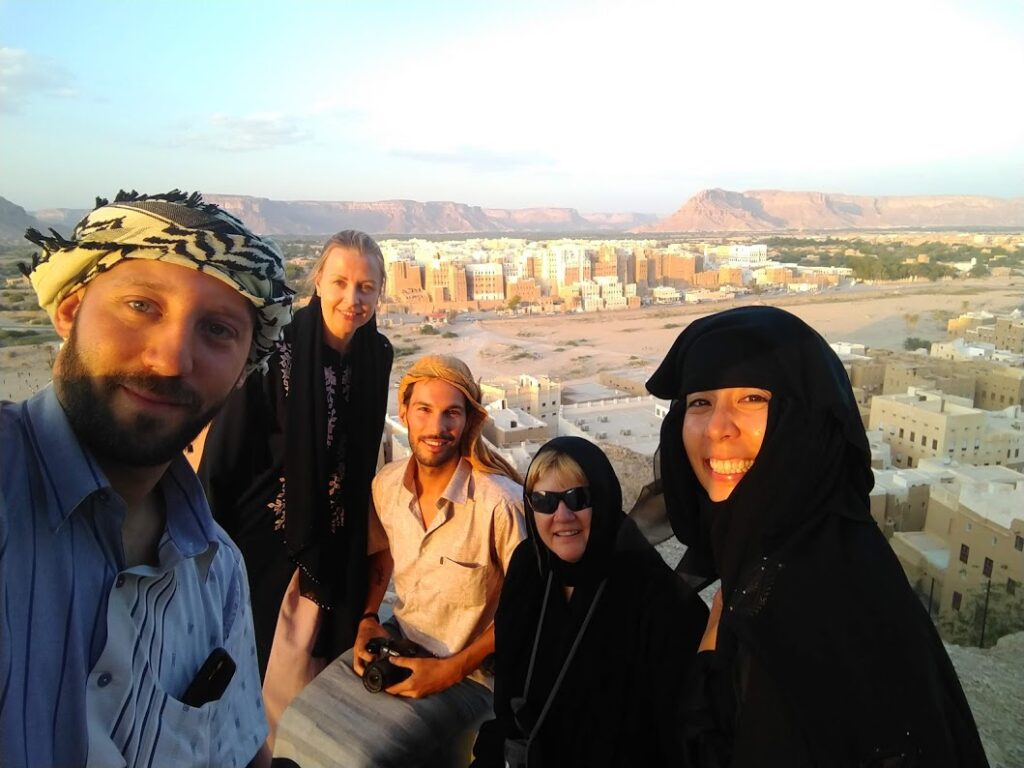
Kais is waiting for us at the bottom of the staircase and just as prayers are ending he calls us down. When I get to him and look at his face I see stress. It’s almost dark and we’ve pushed too far. “Hurry, let’s go,” he says. He is carrying his gun in his hands instead of slung over his shoulder.
Back at the apartment we have dinner sitting on the floor of our dining room, and then Alex sets up a tripod for the long-awaited video interview with Kais. It’s our last night before we leave for Socotra, and Kais is not coming with us; he is driving with Maija back to the Oman border, and we’ll have a different guide on the island.
Matt is the interviewer. He asks Kais what needs to happen for tourism to come back to Yemen in a safe and responsible way. Kais talks about the importance of small groups, of knowledgeable guides, and of having relationships in every area you guide in. He says that for the war to end, everyone must get out of Yemen and let them deal with their own Houthi problem – Saudi Arabia, the Emirates, Iran, America, everyone must get out. “You saw the impact of the Saudi occupation last night, when we stopped to sneak photos of Seiyun palace as if we were robbing a bank,” he says with a wry laugh.
Matt asks about tourism-related programs that benefit Yemenis financially, and Kais talks about initiatives to help women sell crafts to tourists, and programs that fund government infrastructure projects, which are badly needed on Socotra. He says tourism must focus on sustainability and environmental concerns.
You can see as he talks that his love for Yemen is colored with sadness and hope, side by side, and I wonder if I will ever come back here, or if I might convince my friends that it’s a beautiful place worth visiting. I’ve looked at my photos this evening and seen what a paltry thing they are compared to the experience. But as I pack for Socotra and head for bed, I hope the answer is yes.

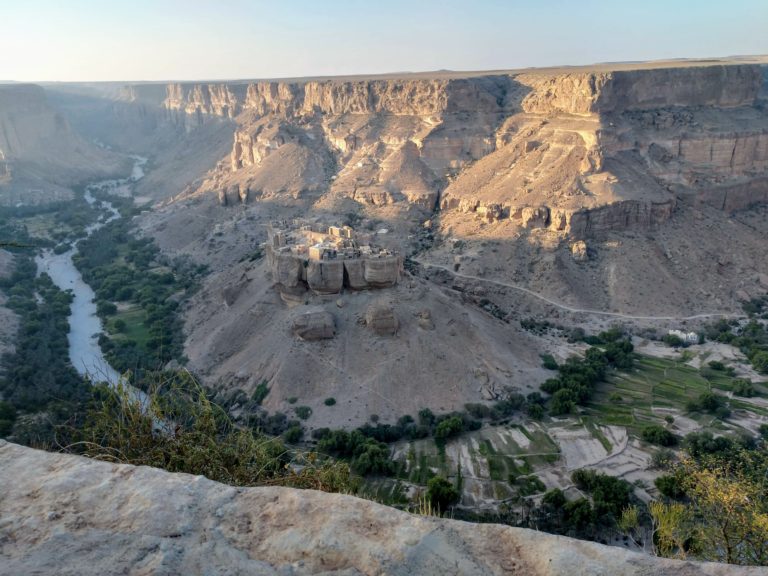
Comments are closed.